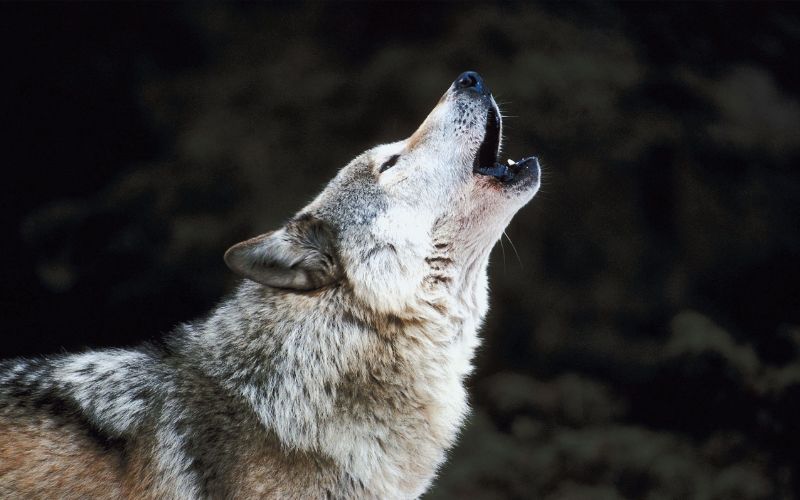
- Details
- By Kaili Berg
The tragic story of a young wolf in Wyoming, named Theia by some, has captured widespread attention and sparked outrage.
This yearling wolf was run down by a 700-pound snowmobile, her mouth taped shut, and paraded, still alive but severely injured, around a local bar before being killed outside.
The brutality of this act has shocked many, but what’s even more alarming is that it was completely legal. In Wyoming, gray wolves are not protected under the Endangered Species Act (ESA), leaving them vulnerable to such heinous acts.
Statistics reveal that in Wyoming, wolves can be killed on sight in 85 percent of the state. This means that wolves, a species integral to the health of our ecosystems and culturally significant to many Native American communities, can be shot, trapped, or even run over without facing legal consequences.
Theia’s only chance for protection was a quicker death, as the state’s laws focus more on how quickly an animal is killed rather than the cruelty inflicted.
Wolves play a crucial role in maintaining the balance of ecosystems. As apex predators, they regulate the populations of prey species such as deer and elk, which in turn helps prevent overgrazing and promotes biodiversity.
The presence of wolves in an ecosystem can lead to a phenomenon known as a trophic cascade, where the effects of their predation ripple through the ecosystem, benefiting numerous other species, including plants, birds, and even fish.
The reintroduction of wolves to Yellowstone National Park in the 1990s is a prime example of this. Before wolves were reintroduced, overgrazing by elk led to the degradation of riverbanks and the loss of vegetation. After wolves were brought back, their predation on elk allowed vegetation to recover, which stabilized riverbanks and provided habitat for other wildlife.
For many Native American communities, wolves hold deep cultural and spiritual significance. Wolves are often revered in Native American mythology and are seen as symbols of strength, loyalty, and endurance. They are considered to be kin, and their protection is intertwined with the preservation of cultural heritage.
For example, the Ojibwe people believe that wolves are their brothers, and the health of wolf populations is directly linked to the well-being of the tribe. The loss of wolves is not just an ecological tragedy but also a cultural one, as it represents a loss of identity and connection to the land.
The lack of protections for wolves, as illustrated by Theia’s tragic death, is not just a legal oversight—it is a failure to recognize the importance of wolves to our ecosystems and to the cultural fabric of Native American communities.
The Endangered Species Coalition is leading the charge to change this. They are working with partners on the ground in Wyoming and other states to push for stronger protections at both the state and federal levels.
Their efforts include organizing Congressional letters of support for wolf protection, bringing experts to Washington, DC to advocate for these animals, and mobilizing hundreds of thousands of activists to pressure decision-makers.
Statistics show that when wolves are protected, entire ecosystems thrive. When they are left unprotected, as they currently are in Wyoming, the consequences are dire—not only for the wolves themselves but for the health of the environment and the cultural identities that are tied to these majestic creatures.
More Stories Like This
Native News Weekly (August 25, 2024): D.C. BriefsUS Presidents in Their Own Words Concerning American Indians
Two Murdered on Colville Indian Reservation
NDAA passes House; Lumbee Fairness Act Advances
NFL, Vikings to Host Native All-American Game, Youth Flag Clinic
Help us defend tribal sovereignty.
At Native News Online, our mission is rooted in telling the stories that strengthen sovereignty and uplift Indigenous voices — not just at year’s end, but every single day.
Because of your generosity last year, we were able to keep our reporters on the ground in tribal communities, at national gatherings and in the halls of Congress — covering the issues that matter most to Indian Country: sovereignty, culture, education, health and economic opportunity.
That support sustained us through a tough year in 2025. Now, as we look to the year ahead, we need your help right now to ensure warrior journalism remains strong — reporting that defends tribal sovereignty, amplifies Native truth, and holds power accountable.
 The stakes couldn't be higher. Your support keeps Native voices heard, Native stories told and Native sovereignty defended.
The stakes couldn't be higher. Your support keeps Native voices heard, Native stories told and Native sovereignty defended.
Stand with Warrior Journalism today.
Levi Rickert (Potawatomi), Editor & Publisher

